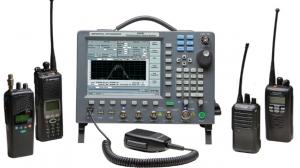Land Mobile Radio Market to Surpass USD 30.2 Billion by 2035, Driven by Demand for Secure, Real-Time Communication
The LMR market is growing due to increasing demand for secure, real-time communication in public safety, transportation, and critical infrastructure.
Organizations across both developed and developing economies are investing heavily in modernizing legacy communication systems and shifting toward more efficient, spectrum-optimized digital platforms. Public safety agencies such as police, fire departments, and emergency medical services are at the forefront of this transformation, as LMR systems provide resilient, encrypted, and interference-free communication necessary during emergencies. Similarly, sectors such as mining, utilities, and transportation are deploying digital LMR networks to enhance operational coordination, worker safety, and overall productivity in geographically dispersed and often hazardous environments. As demand grows for interoperable, cross-agency communication systems and reliable data transmission under high-pressure conditions, the LMR market continues to solidify its role in critical infrastructure development worldwide.
Get Ahead with Our Report: Request Your Sample Now!
https://www.futuremarketinsights.com/reports/sample/rep-gb-5889
Key Takeaways for the Land Mobile Radio Market
The Land Mobile Radio market is witnessing robust growth due to increased reliance on secure, always-available communication platforms by both governmental and industrial sectors. Digital LMR systems such as P25, DMR, and TETRA are increasingly replacing traditional analog systems, offering high-quality audio, GPS tracking, remote monitoring, and seamless integration with other digital tools. The ability to operate efficiently in remote and challenging terrains makes these systems indispensable for first responders, defense forces, and remote industrial operations. Additionally, the rising focus on disaster preparedness, homeland security, and emergency response management is propelling public sector investment in LMR networks across regions, particularly in North America, Europe, and parts of Asia-Pacific. With evolving regulatory standards mandating greater inter-agency coordination, digital LMR adoption is set to accelerate over the next decade.
Emerging Trends in the Global Market
Several important trends are shaping the future of the LMR market. One of the most prominent is the convergence of LMR with LTE and broadband technologies, enabling hybrid networks that combine the reliability of LMR with the high-speed data capabilities of 4G and 5G networks. This hybrid approach allows organizations to maintain secure voice communication while also benefiting from data-rich applications such as live video streaming, real-time location services, and remote diagnostics. Another significant trend is the shift toward software-defined radios and cloud-based communication platforms, which enhance network scalability and ease of management. Vendors are increasingly offering LMR-as-a-service models, reducing the upfront cost for users and improving accessibility for smaller municipalities and private enterprises. Environmental durability and energy efficiency are also becoming key product differentiators, as LMR devices are deployed in extreme operating conditions.
Significant Developments in the Global Sector: Trends and Opportunities in the Market
The global LMR sector is undergoing a dynamic transformation marked by technological innovation and regulatory support. Countries are actively upgrading their national public safety networks to digital standards, driving long-term opportunities for LMR manufacturers and service providers. For instance, national-level adoption of P25 in the United States and TETRA in Europe has created a surge in procurement contracts for LMR devices, infrastructure, and system integration services. Furthermore, new spectrum allocations and better frequency planning are enabling more efficient utilization of radio resources, particularly in densely populated and high-demand areas. These developments are also encouraging private network deployments across oil and gas, transportation, and manufacturing industries. Additionally, public-private partnerships are emerging as a key model for LMR infrastructure expansion, particularly in regions where government resources are limited but industrial demand is high.
Recent Developments in the Market
In recent years, the LMR market has seen notable developments in both technology deployment and strategic collaboration. Vendors are increasingly launching next-generation portable and vehicle-mounted radios that support both digital and analog operations, easing the transition for legacy users. There has also been a wave of acquisitions and alliances aimed at consolidating expertise, expanding global footprint, and integrating complementary technologies such as cybersecurity, LTE, and AI-powered analytics. Governments across multiple regions have announced major investments in upgrading emergency communication networks, including multi-billion-dollar initiatives in the U.S., Canada, the U.K., and Australia. Emerging markets in Asia and Latin America are also ramping up digital LMR adoption, especially in urban infrastructure projects and national security initiatives.
Detailed Market Study: Full Report and Analysis
https://www.futuremarketinsights.com/reports/land-mobile-radio-system-market
Competition Outlook
The global LMR market is highly competitive, characterized by a mix of multinational technology giants and specialized regional vendors. Companies are competing on innovation, interoperability, durability, and price-performance ratio. Leading players are continuously enhancing their product lines with ruggedized hardware, AI-driven analytics, GPS integration, and LTE-compatibility to cater to evolving customer needs. Strategic partnerships with government agencies, telecom operators, and system integrators are common, as companies seek to deliver end-to-end solutions with minimal downtime and long lifecycle support.
Key players
Key players dominating the global market include Motorola Solutions Inc., Harris Corporation, Thales Group, Hytera Communications Corporation Ltd., JVCKENWOOD Corporation, Tait Communications, Simoco Wireless Solutions, Sepura PLC, Leonardo S.p.A., and BK Technologies. These companies provide a wide array of LMR solutions ranging from handheld radios and base stations to comprehensive network infrastructure and support services, catering to diverse verticals such as public safety, defense, utilities, mining, and transport.
Key Segmentations
Key segmentations of the market include technology type, which comprises analog and digital (P25, DMR, TETRA, and others). By application, the market spans public safety, commercial, industrial, and transportation sectors. By end-user, segments include military & defense, emergency & medical services, law enforcement, oil & gas, and utilities. Geographically, North America leads in terms of market share due to early adoption and heavy public safety investments, followed by Europe and Asia-Pacific, where increasing urbanization and infrastructure development are driving demand.
Telecommunication Industry Analysis Reports
Commercial Satellite Imaging Market Size and Share Forecast Outlook 2025 to 2035
https://www.futuremarketinsights.com/reports/commercial-satellite-imaging-market
Western Europe Base Station Antenna Market Outlook 2025 to 2035
https://www.futuremarketinsights.com/reports/base-station-antenna-industry-analysis-in-western-europe
Korea Submarine Cable Market Outlook 2025 to 2035
https://www.futuremarketinsights.com/reports/submarine-cable-industry-analysis-in-korea
North America In-building Wireless Market Outlook 2025 to 2035
https://www.futuremarketinsights.com/reports/north-america-in-building-wireless-market
Latin America OTT Services Market Outlook 2025 to 2035
https://www.futuremarketinsights.com/reports/latin-america-ott-services-market
Ankush Nikam
Future Market Insights, Inc.
+ +91 90966 84197
email us here
Visit us on social media:
LinkedIn
Facebook
YouTube
X
Legal Disclaimer:
EIN Presswire provides this news content "as is" without warranty of any kind. We do not accept any responsibility or liability for the accuracy, content, images, videos, licenses, completeness, legality, or reliability of the information contained in this article. If you have any complaints or copyright issues related to this article, kindly contact the author above.
Desjardins Negative Vacation Bank Class Action – Certified on Consent for the Purposes of Settlement
Refined Cane Sugar Market to Reach USD 120.1 Billion by 2035 As Rising Demand for Processed Food and Beverage Ingredient
Leading ERP solutions to showcase at Dublin ERP HEADtoHEAD™ event
Kalendarium
Więcej ważnych informacji
 Jedynka Newserii
Jedynka Newserii

 Jedynka Newserii
Jedynka Newserii

Transport

Import materiałów budowlanych z Rosji zagrożeniem dla konkurencyjności europejskiego rynku. Konieczne są zmiany i egzekwowanie sankcji
Unia Europejska powinna zrewidować politykę celną na import materiałów budowlanych spoza państw członkowskich, w tym państw wschodnich – twierdzą uczestnicy konferencji „Bezpieczeństwo gospodarcze UE”. Obecnie Wspólnota nakłada na europejskich producentów coraz więcej ograniczeń, nie rewidując polityki celnej, co przekłada się na systematyczne osłabienie konkurencyjności przedsiębiorstw, spadek produkcji i zagrożenie dla miejsc pracy.
Konsument
Polacy odczuwają brak wiedzy na temat inwestowania. Może to sprzyjać podejmowaniu nieracjonalnych decyzji finansowych

Co trzeci Polak odczuwa brak wiedzy w obszarze inwestowania, a tylko co piąty chciałby pogłębić swoją wiedzę na ten temat – wynika z badania „Poziom wiedzy finansowej Polaków 2025”. Ci, którzy na własną rękę szukają informacji i porad, coraz częściej sięgają do blogów, portali, podcastów i wideo w internecie. Eksperci przestrzegają, że finansowych i inwestycyjnych porad udzielają nie tylko specjaliści w danej dziedzinie, więc potrzebna jest zasada ograniczonego zaufania.
Handel
Do 2030 roku liczba plastikowych opakowań w e-handlu modowym może się podwoić. Ich udział najszybciej rośnie w Polsce

Wraz ze wzrostem kanału e-commerce w branży modowej rośnie liczba wykorzystywanych opakowań, z których znaczną część wciąż stanowią te z plastiku. Do 2030 roku w Polsce e-sprzedawcy zużyją 147 mln plastikowych opakowań – wynika z badania przeprowadzonego na zlecenie DS Smith. Można zauważyć rosnący trend wśród marek modowych, które coraz częściej wybierają opakowania wykonane z papieru lub materiałów z recyklingu. To o tyle istotne, że polscy konsumenci odczuwają wyrzuty sumienia z powodu ilości plastiku, w którym dostarczane są ich zamówienia.
Partner serwisu
Szkolenia

Akademia Newserii
Akademia Newserii to projekt, w ramach którego najlepsi polscy dziennikarze biznesowi, giełdowi oraz lifestylowi, a także szkoleniowcy z wieloletnim doświadczeniem dzielą się swoją wiedzą nt. pracy z mediami.









.gif)

 |
| |
| |
|